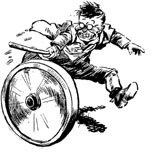
The Squeaky Wheel Gets the Grease
IN THE CHURCH, AS EVERYWHERE ELSE
Just a few dozen parishioners gathered in the crescent-shaped driveway in front of St. Albert the Great Parish in Weymouth, Massachusetts, that morning.
It was Tuesday, May 25, 2004. Everyone there that day remembers that morning.
All waited for just one simple thing: “the letter.”
Word had sped through Weymouth and beyond its borders the night before — speculation about the contents of the impending arrival of the epistle. Actually, the missive could have and should have been described as more of a gospel because of its anticipated good news, sent from none other than Archbishop Sean O’Malley, the mitered head of the Catholic Archdiocese of Boston.
ETA: before 11 AM.
And sure enough, it is before 11 that morning when the unmistakable purple-and-orange-lettered FedEx panel truck bounces up and down in the potholes that pockmark the entranceway to the church from Washington Street, the main drag in that wrung-out New England town of 55,000. After screeching to a halt and causing a small cloud of dust to rise, as if incense offered in a holy sanctuary during high Mass, the driver hops out. He jogs into the rectory and delivers “the letter,” right into the hands of the church’s pastor, Fr. Ronald Coyne.
Silence wraps itself around those assembled outside. No way would God let them down. Coyne even had the forethought to purchase a dozen white balloons. He planned to tie the rubber-and-helium bouquet to the railing at the front entrance of the blond-brick, 1960s-style church. Balloons bouncing in the breeze would be a signal to the faithful that the church would not be closed as the Archbishop had threatened months earlier. It would be a signal that St. Albert’s has been spared, like Moses had been spared from Pharaoh.
You May Also Enjoy
Who knows what experiences help make people one kind of person or another, and what little change might have made the villain a hero or the hero a villain.
My wife and I have just been in Yugoslavia on a two-week visit with a…
Vanity Unmasked... The Color of Money... Against Anglo-Americanese... Whale Wails... The Troll Master... Gimme Five... and more

